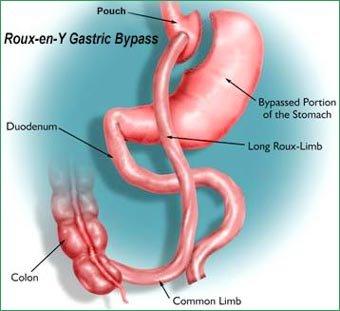RNY Gastric Bypass (Long, Distal & FOBI)
The most commonly performed weight loss operation in the UK, this involves creating a small pouch at the top of the stomach using staples. The large portion of the stomach is closed off and cannot accept food, while the small pouch restricts the amount of food that can be eaten at one time.
From the small gastric pouch the food travels down a loop of small bowel without it being mixed with digestive juices. The food then enters the small bowel lower down where digestion starts.
Patients usually lose weight after this operation but a number will put it on again after a few years. This is usually the result of several factors, including a stretching of the pouch and the connection between pouch and small bowel, stopping regular exercise or poor eating habits.
To avoid stretching of the connection between the pouch and the small bowel, we can place a non-adjustable silicone ring around the lower section of the pouch. This is known as the FOBI banded RNY gastric bypass.
When weight regain happens revision surgery can be a solution.
Some patients will develop a narrowing of the join between gastric pouch and small bowel due to excessive scarring. This leads to swallowing difficulties with sickness and vomiting. The narrow area can be stretched with a special balloon during a procedure called gastroscopy, and is carried out under sedation.
After this operation there is a risk of Vit B12 deficiency making it essential that regular blood tests are done.
The gastric bypass is recommended for patients also suffering from hiatus hernia or reflux, as this operation prevents acid from leaking into the gullet.
